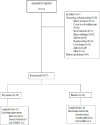Potential Role of Bupropion Sustained Release for Cancer-Related Fatigue: a Double-Blind, Placebo-Controlled Study
- PMID: 29936730
- PMCID: PMC6103561
- DOI: 10.22034/APJCP.2018.19.6.1547
Potential Role of Bupropion Sustained Release for Cancer-Related Fatigue: a Double-Blind, Placebo-Controlled Study
Abstract
Background: Cancer-related fatigue (CRF) is very common and can be experienced at all stages of disease and in survivors. CRF causes patients more distress than pain or nausea and vomiting. Different pharmacologic interventions have been evaluated for the management of CRF. The purpose of this study was to determine the efficacy of bupropion sustained release (SR) as a treatment for fatigue in patients with cancer. Methods: In this randomized, double-blind, placebo-controlled trial, patients with fatigue due to cancer were randomly assigned to either 150mg daily of bupropion SR or matching placebo. The primary endpoint was the changes in average daily fatigue from baseline to week 4 using the Functional Assessment of Chronic Illness-therapy- Fatigue (FACIT-F) questionnaire. Results: 40 patients were randomly assigned to treatment with bupropion SR or placebo (20 in each group). Analysis of covariance (ANCOVA) showed a significant improvement in fatigue and quality of life in the bupropion group compared to baseline (P=0.000). Secondary outcome, including depression, severity of fatigue and performance status didn’t show significant difference between groups. Generally, bupropion SR was tolerated well. Conclusion: Four weeks of 150 mg bupropion SR improve fatigue significantly in cancer patients. Bupropion has potential as an effective and safe pharmaceutical agent for treating CRF.
Keywords: Fatigue; cancer; Bupropion; clinical trial.
Creative Commons Attribution License
Figures
References
MeSH terms
Substances
LinkOut - more resources
Full Text Sources
Medical
Research Materials


